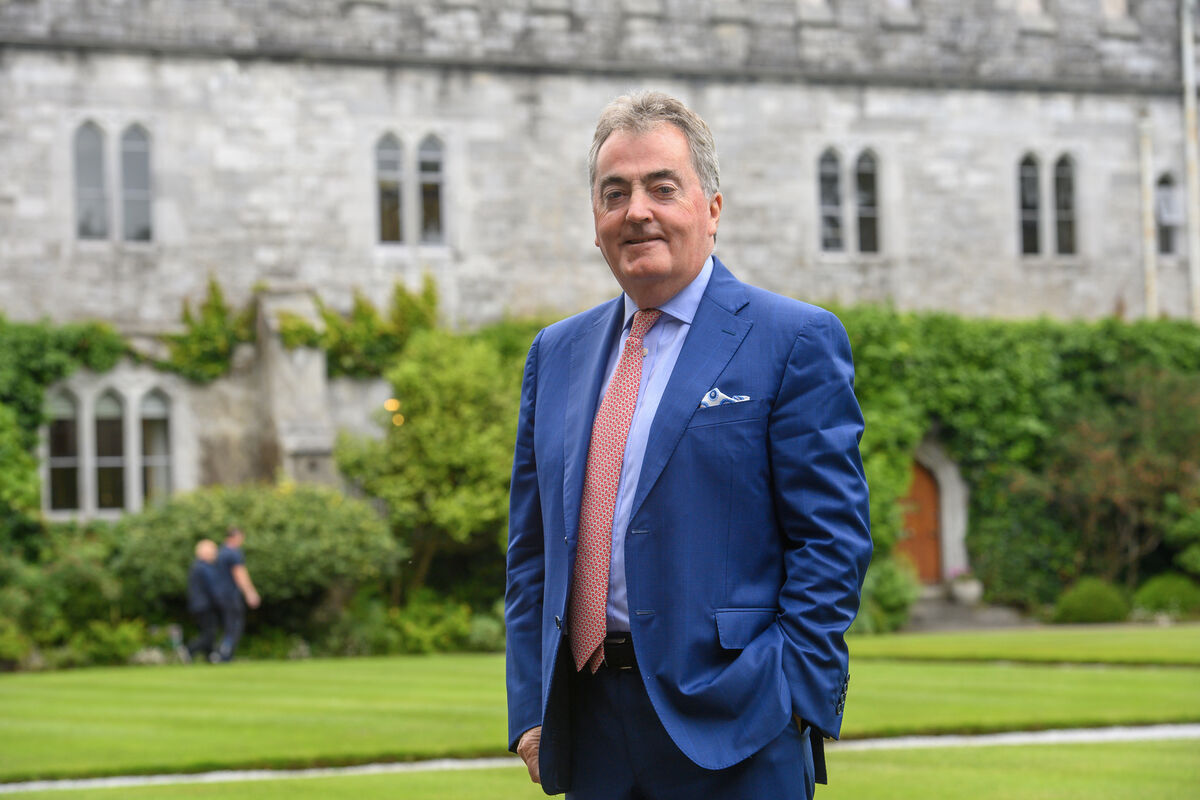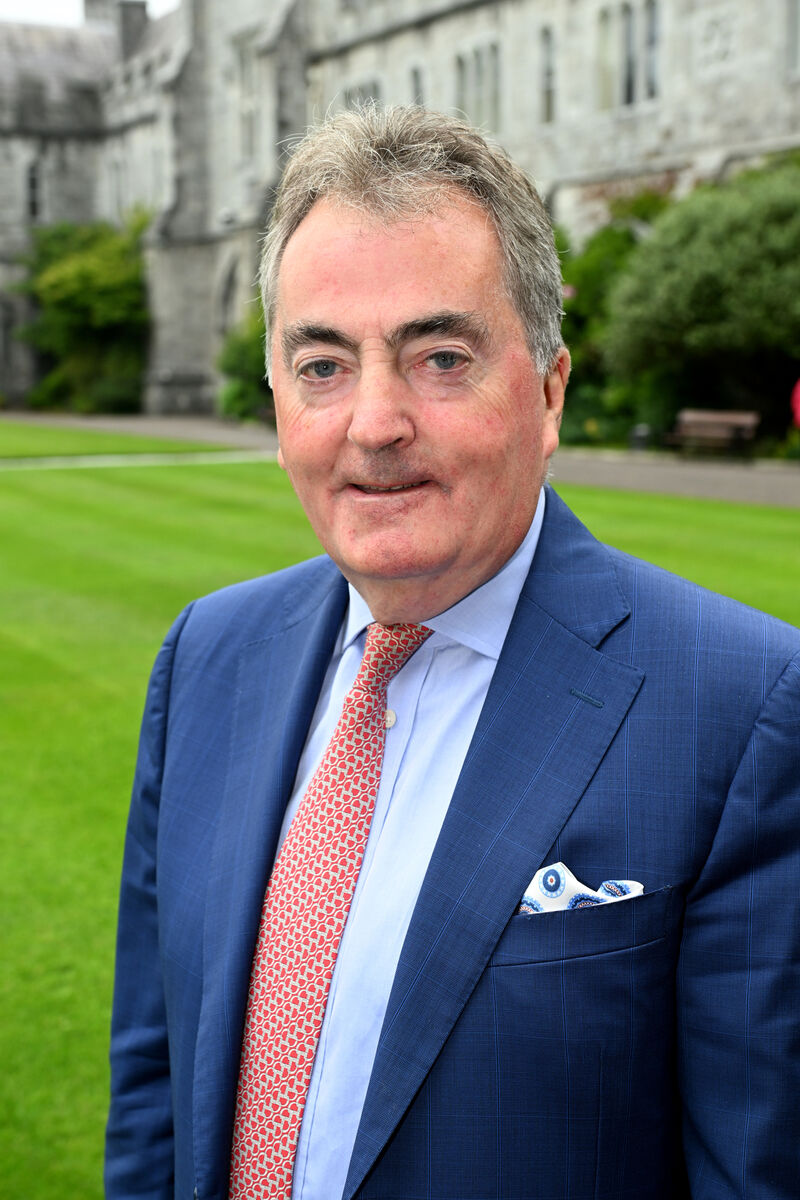'Radical' solutions required to tackle 'emergency' in energy, water, and transport

Sean O’Driscoll, chair of UCC’s Governing Authority, claims public servants are 'more afraid of the public accounts committee than they are of the economy declining'. Picture: Dan Linehan
Ireland is facing a “national emergency” in infrastructure, Sean O’Driscoll bluntly states, as he speaks to the from a private room on the grounds of University College Cork.
In a wide-ranging discussion in which he claims public servants are “more afraid of the public accounts committee than they are of the economy declining” he warns of crises mounting in our energy, water and transport sectors.
An ‘accelerating infrastructure’ task force, chaired by public expenditure minister Jack Chambers, has been established and Mr O’Driscoll is a member. Why, I ask him, does he feel compelled to intervene in the debate?
“People in business are uncomfortable speaking out, generally,” he says. “US multinationals won’t do it because it draws attention to them. The public sector won’t do it. The private sector keeps its head down. I’ve reached a point in my life where I’ve nothing to lose, or fear, by doing so.”
He demands radical policy changes, aware that they could attract significant opposition, and is critical of inertia at all levels of government.
“Many of us in the business world have been talking about this privately for at least a decade, but if you spoke about it publicly, it was seen as ‘talking down Ireland’, or being disloyal, or making the IDA’s job more difficult in attracting foreign direct investment,” he says.

“You find in this country that unless something is spoken about publicly, it doesn’t get the traction it deserves.”
In the Institute for Management Development World Competitiveness Rankings last year, Ireland placed fourth out of 67 countries for overall competitiveness, but 17th for infrastructure provision and 38th for basic infrastructure.
In last year’s Draghi report on EU competitiveness, Ireland ranked bottom of the pile for the timely delivery of renewables infrastructure.
Radical solutions are required, Mr O’Driscoll claims, including the Government extending provision of planning conditions currently availed of by local authorities and on State-backed land such as prisons and army barracks.
Part 8 planning allows local authorities to undertake development on their land by elected members voting through proposals after public consultation, without the need for An Bord Pleanála approval.
Extending Part 8 to schemes requiring private land could see land owners mounting legal challenges, but the UCC and ESRI chair insists political bravery is required or Ireland faces “catastrophic” consequences, including potential water and electricity shortages.
He further warns the bar for judicial reviews is too low and must be overhauled.
“We traditionally had a two-tier planning system of local authorities and An Bord Pleanála. We now have a third tier: the courts. It’s a large industry for the legal profession. Judicial reviews weren't brought in for the reasons we are now seeing.
“You can send an objection to ABP with a cheque for €100 and can tie projects up for an indefinite period. We’ve made the roll-out of infrastructure far more difficult than it was.”
He points to a 2020 review now “gathering dust” that was chaired by former president of the High Court, Mr Justice Peter Kelly. It found that the entitlement to seek judicial review proceedings was “unsatisfactory and wasteful of time and money”.
Mr O’Driscoll insists legislation should be used to significantly reduce the volume of vexatious reviews “tomorrow”.
"We have to get to the point where the common good prevails over personal interest”.
As well as tackling judicial reviews, he urges local authorities to work closer with utility firms on their development plans, and says the government must commit to multi-year funding so the likes of Uisce Éireann and ESB can plan projects accordingly.
The same goes for private businesses. In Cork, Apple has been lobbying government ministers, including Taoiseach Micheál Martin, to commit to the northern distributor road, to free up gridlocked traffic around its Holyhill headquarters and enable land to be developed in the area.
Mr O’Driscoll says: “They have 6,000 people at their campus in Holyhill, traffic is a nightmare for them. The road not only solves their problem, but unlocks land for 10,000 homes and opens up three huge tracts of land for industrial development.”

In April, the Taoiseach told the Irish Examiner that “we do need to get on with the distributor road”, but warned of costs at the time and the volume of projects that must be funded through the revised National Development Plan.
But Mr O’Driscoll says the government should consider increasing investment in infrastructure to up to 8% of GDP in the coming years, and 5% annually for the remainder of the next 15 years.
“This is a government with a huge majority, at the start of its five-year term. If a government in such circumstances doesn’t see itself as capable of getting this fixed, I don’t know what government would. Now is the time to make those decisions.”
Public expenditure minister Jack Chambers
Sean O’Driscoll – ESRI chairman and former chairman and CEO of the Glen Dimplex Group
Mary Hughes – Chartered Town Planner
Michele Connelly – Former KPMG partner and head of global infrastructure
Feargal O’Rourke – Chairman of IDA Ireland
Eamon Booth – Former MD of John Paul Construction
Imelda Mannion – Former Jacobs VP for global programme management
Chair of the Major Projects Advisory Group
CEO of Uisce Éireann
Managing Director of ESB Networks
CEO of Land Development Agency
Interim CEO of National Transport Authority
Former Chief Executive of Waterford City and County Council





